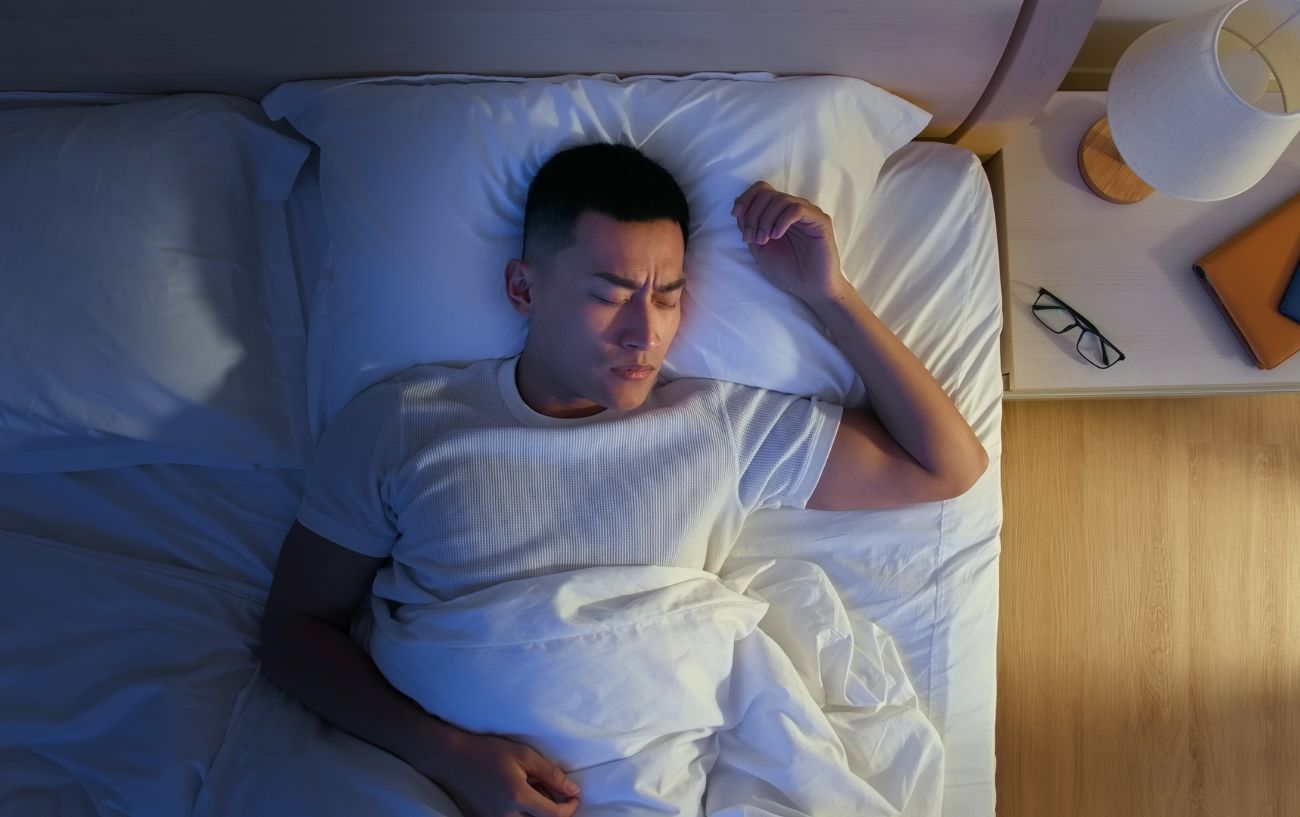If you wear a fitness tracker such as a Fitbit, WHOOP, or the Oura Ring, one of the main biometrics that is provided by the fitness wearable is your sleep patterns.
Sleep trackers not only provide the duration of your sleep but also the time spent in each phase of sleep. But how much sleep do you need per night? How much deep sleep and REM sleep do you need?
As the recommended amount of sleep varies greatly depending on age, you could need anywhere from 7-9 hours for an adult and 9.5 – 18 hours for a child.
We spoke to three sleep experts to get their insight into the different sleep phases and tips to improve your sleep quality and ultimately answer the question, “How much sleep do you need to feel your very best for what life throws at you?”
Lets jump in!

How Much Sleep Do You Need?
The number of hours of sleep you should get varies across the lifespan, with infants and children needing the most sleep and seniors needing the least.
Individual variations in sleep needs will occur within these trends.
The general recommendations from the National Sleep Foundation in terms of how much sleep you should get per night by age are as follows:1Hirshkowitz, M., Whiton, K., Albert, S. M., Alessi, C., Bruni, O., DonCarlos, L., Hazen, N., Herman, J., Adams Hillard, P. J., Katz, E. S., Kheirandish-Gozal, L., Neubauer, D. N., ODonnell, A. E., Ohayon, M., Peever, J., Rawding, R., Sachdeva, R. C., Setters, B., Vitiello, M. V., & Ware, J. C. (2015). National Sleep Foundations updated sleep duration recommendations: final report. Sleep Health, 1(4), 233243. https://doi.org/10.1016/j.sleh.2015.10.004
How Many Hours of Sleep Do You Need? (By Age Group)
- 0-2 months (Newborns): 12-18 hours
- 3-11 months (Infants): 14-15 hours
- 1-3 years: (Toddlers) 12-14 hours
- 3-5 years: (Preschoolers) 11-13 hours
- 5-10 years: (School-age) 10-11 hours
- 11-17 years: (Pre-teens and teenagers) 8.5-9.5 hours
- Adult 18+ years (Healthy adults): 7-9 hours
- Older adults: 7-8 hours

What Are the Different Phases of Sleep In the Sleep Cycle?
Bianca Grover, an Exercise Physiologist, Medical Exercise Specialist, Health Coach, and Owner of Bianca Grover Fitness, says that our sleep cycles are broken into two main categories: Non-Rapid Eye Movement (NREM) and Rapid Eye Movement (REM).
Of these main types of sleep, NREM is further broken into two subcategories that most people are more familiar with: light sleep and deep sleep.
However, we can break NREM down even furtherinto three stages that reflect how deep the sleep is, explains Grover.
These stages are N1 (Light Sleep), N2 (Deeper Sleep), and N3 (Deepest Non-Rem Sleep). On average, about 75% of sleep is spent in these NREM stages.

According to Grover, the normal sleep cycle goes from NREM to REM, following a general timing and percentage of sleep duration as follows:
- N1 (Light Sleep) starts us off and is about 5% of our sleep. So, if you sleep for 8 hours, the N1 light sleep stage is roughly 24 minutes.
- N2 (Deeper Sleep) is typically the sleep phase where adults spend the greatest percentage of time relative to the other stages of sleep. Grover says the N2 stage of sleep usually constitutes about 45% of our sleep time, just over 3 1/2 hours of an 8-hour sleep duration.
- N3 (Deepest Non-Rem Sleep) was previously broken into two stages, but the scientific community agreed that it was not necessary. The N3 deep sleep phase makes up about 25% of our sleep per night, but this percentage decreases with age. Therefore, a younger adult might have about two hours of deep sleep per night during an eight-hour sleep, while an elderly adult will have less sleep than that.
- REM Sleep (Rapid Eye Movement) takes the remaining 25% of the time spent asleep, which means that the average REM sleep time per night would be 2 hours if you sleep for eight hours.
Grover explains that we call it a sleep cycle for a reason.

How Much of Each Sleep Stage Do You Need?
Dan Ford, a Sleep Psychologist and Founder of The Better Sleep Clinic, provides specific information regarding how long we spend in each stage of sleep at night, reporting the sleep phase percentages as follows:2Purves, D., Augustine, G. J., Fitzpatrick, D., Katz, L. C., LaMantia, A.-S., McNamara, J. O., & S Mark Williams. (2001). Stages of Sleep. Nih.gov; Sinauer Associates. https://www.ncbi.nlm.nih.gov/books/NBK10996/
Across the night, a young adult (mid to late 20s) will spend roughly 5% of the night in stage one sleep, 60% of the night in stage two sleep, 10% – 20% of the night in stage three sleep and the remainder in REM sleep or awake, he shares.
In any given sleep cycle, the amount of NRM and REM sleep will differ, as we tend to get more NREM sleep at the start of the night and more REM sleep towards the morning.
Our experts provide more specific insight into sleep recommendations for deep sleep, REM sleep, and light sleep for overall health:

How Much Light Sleep Do You Need?
In general, light sleepas it is actually two stages put togetheris the largest percentage of your sleep cycle, and you want to keep it as consistent as possible, advises Grover.
This means you should limit disruptions as you are attempting to fall asleep, and most importantly avoid things that may cause you to wake up in the middle of the night.
How Much Deep Sleep Do You Need?
Ford says deep sleep is characterized by brainwaves in the 0.5 – 4.5hz band, which are known as delta waves or slow waves.
During deep sleep, the body is fully relaxed and physiological measures are reduced (e.g. heart rate is at its lowest etc), explains Ford.
It is hard to wake someone from this stage of sleep. Much physical repair and restoration happens during this stage of sleep as the sympathetic nervous system is off.
Susan Miller, a Certified Sleep Technician, Registered Polysomnographic Technologist” (RPSGT), and Founder of Sleep Mattress HQ, concurs.
The benefits of deep sleep include physical recovery, energy restoration, and the secretion of growth hormones, promoting cellular repair, says Miller. It plays a vital role in cognitive functioning and emotional regulation, contributing to overall well-being.
Miller says that how much deep sleep you need varies with age.
Adults generally aim for 20-25% of their total sleep time in deep sleep, which is roughly 1.5 to 2 hours, says Miller, referring to the number of deep sleep minutes per night if you sleep for eight hours. This percentage tends to decrease with age.
This is the total time for deep sleep, but it doesnt occur all at once.
During the night, you go through multiple sleep cycles, each consisting of several stages, including deep sleep, notes Miller. A deep sleep cycle portion typically lasts for about 20-30 minutes.

How Much REM Sleep Do You Need?
REM sleep is a stage of sleep characterized by the eyes darting back and forth under the eyelids (hence rapid eye movements), heightened EEG, and sympathetic activity in the body, with accompanying paralysis of muscles, says Ford.
We experience vivid dreams during this stage, and its thought that REM sleep contributes to the processing of emotional memories.
So, how much REM sleep should you get?
On average, adults spend about 20-25% of their total sleep time in REM sleep. This amounts to approximately 90-120 minutes of REM sleep each night, suggests Miller.
However, individual variations exist, and the need for REM sleep can vary. A healthy sleep cycle involves progressing through different stages, with REM sleep occurring cyclically.

Tips to Get A Good Night’s Sleep
So, how can you get more deep sleep? How can you improve the quality of your sleep?
Ford says NREM sleep is closely related to prior wakefulness and activity.
Basically, the more active you are, in terms of exercise, and the longer you spend awake, the more deep sleep you will get, suggests Ford.
There is some evidence that a poor diet (i.e. Western diet, high fat and sugar) reduces N3 sleep. A diet higher in fiber seems to increase N3 sleep.”
One of the best ways to increase how much deep sleep you get every night is to optimize your sleep environment to promote restful sleep.
Deep sleep can be enhanced by maintaining a consistent sleep schedule, creating a relaxing bedtime routine, and optimizing your sleep environment by keeping it cool and dark. Avoid stimulants like caffeine close to bedtime and engage in regular exercise, advises Miller.
Creating a conducive sleep environment and adopting healthy sleep habits can contribute to maximizing the duration and quality of your deep sleep phases.

Therefore, in addition to optimizing your sleep environment, another key strategy for how to get more deep sleep at night is to work on your sleep hygiene, sleep routine, and lifestyle behaviors that contribute to getting better sleep.
One thing I love for the relaxing bedtime routine Ford advises is the Quiet Mind Weighted Pillow.
This product was initially designed for people with ADHD and anxiety as a way to promote a sense of calm and relaxation during the day or at night.
You can hug the pillow, hold it, or place the pillow on your lap, and the Quiet Mind weighted pillow provides deep pressure to help ground you and calm the nervous system in the same way that a weighted blanket can.
However, what is unique about having a weighted pillow vs. a weighted blanket is that you can also just hug it against your body when you need a sense of comfort while lying in bed, or sitting on the couch, or even walking around the house if you are in an anxiety spiral.
Personally, I love to use the Quiet Mind weighted pillow on my lap if I am watching TV or sitting on the couch to read a book before bed.
I find that it helps reflexively calm or quiet my body and mind (I see where the company gets the name&) so that I can easily wind down before bed.
This is particularly helpful when I have been out and about late at night, feel particularly agitated, havent been able to follow my normal sleep routine, or just have extra anxiety and trouble sleeping.
Then, when I lie in bed, rather than feeling restless or having 1 million thoughts going through my head, I seem pre-calmed and able to fall asleep more easily despite whatever stress is going on physically or mentally.
Finally, many people ask: is deep sleep better than REM sleep, or is REM sleep better than deep sleep?
Both are important and play different roles in physical and mental health, suggests Ford.
Grover agrees, saying, When it comes to sleep, all stages in the cycle play their part and are important. Much like many aspects of health, balance is key.
If you would like to get into more detail about REM sleep in particular, check out this article:



